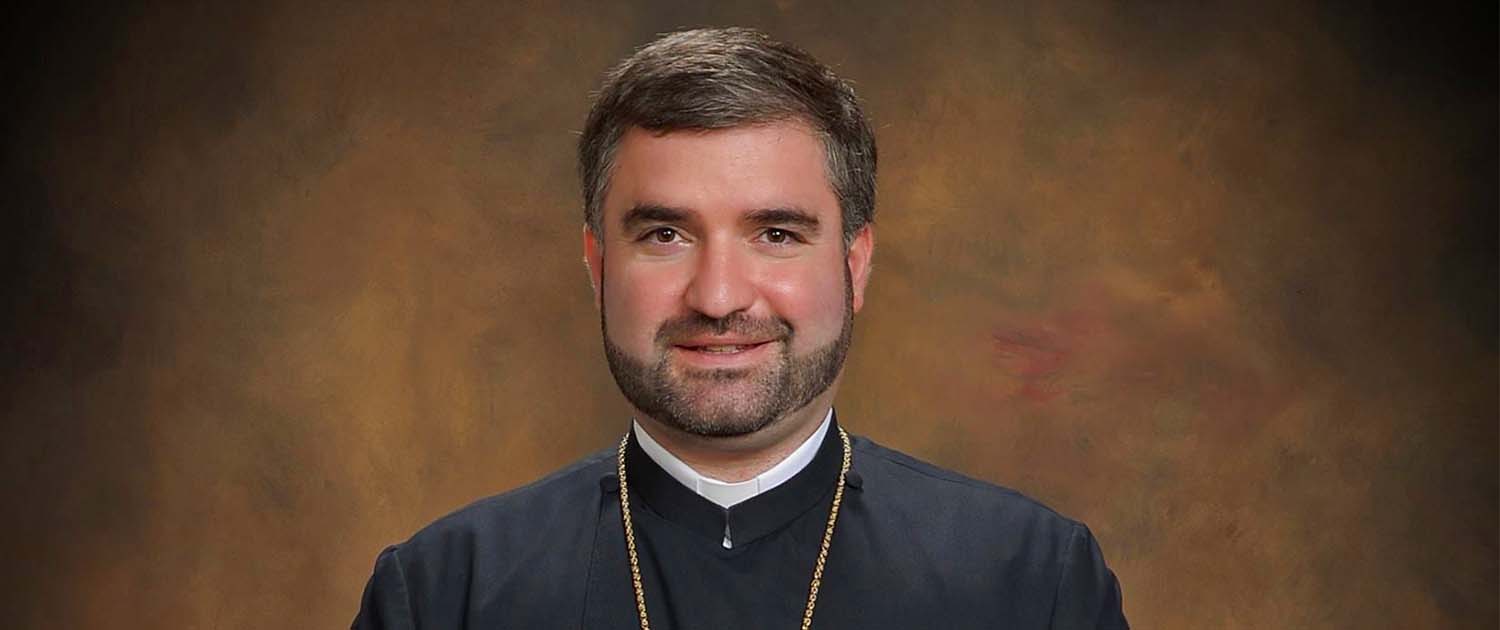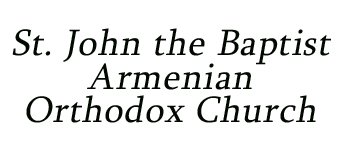FR. MESROP PARSAMYAN’S ADDRESS TO THE DIOCESAN ASSEMBLY
Friday, May 6, 2022
As part of the proceedings of the 120th Diocesan Assembly, Fr. Mesrop Parsamyan presented an address to the clergy and lay delegates, as one of the three candidates for the office of Primate. In his remarks, Fr. Parsamyan sketched out his background and upbringing, and revealed his early experience of God’s call, and some of his thoughts about the future.
As a personal essay, the address provides a wonderful window onto the spirit and vision of Fr. Parsamyan—both for those who have yet to meet the newly-elected Diocesan Primate in person, and for those who have already gotten to know his admirable qualities.
What follows is the text of his address to the delegates and clergy, presented as an introduction to our new Primate.
*****

Very Rev. Fr. Mesrop Parsamyan, Primate Elect
Address of Fr. Mesrop Parsamyan
To the 120th Diocesan Assembly, New York City: May 6, 2022
Christ is risen from the dead! Քրիստոս յարեաւ ի ﬔռելոց։ [Krisdos haryav ee merelots.]
I would like to thank the Diocesan Council for nominating me to the office of Primate of the Eastern Diocese of the Armenian Church of America. I am honored and humbled.
I was born in Soviet Armenia, a difficult period in our history for the nurture of our Christian faith and values. My spiritual journey started when, as a teenager, I walked the 30-mile distance from Yerevan to Khor Virab [Deep Pit], the cradle of our faith. I spent the night at the monastery and at dawn, when the rays of the rising sun began to slowly emanate, illuminating Mt. Ararat, the sounds of church bells caused a stir in my soul. I could hear the deacons singing “Առաւօտ Լուսոյ [Aravod Looso] / O morning of light, O thou righteous sun, shed thy light on me.”
Following this first encounter with the Lord, I made a pledge in my heart that all the days of my life hereafter, I should try and live in the presence of the Lord, in His life-giving light.
I do not want to take your time with details of my ministry in the church, in administrative, academic and pastoral assignments at Holy Etchmiadzin, in Europe—France, Germany, Belgium, Switzerland—and here in America. Details of my biography have already been sent to you.
But I’d like to share my first experience of life in our Diocese. I came here, back in 2015, as a servant: as a pastor to a small parish in the Midwest—the heartland of America. I was nervous, wondering, “Would I be accepted?”
But the people there proved to be so alive with faith and joy and hospitality. We all came together immediately, because we all had the same Armenian spirit—that overcame the issue of where we were born in years past, and united us as a church family, moving forward together.
That wonderful church community—Holy Virgin Mary and Shoghagat, in Belleville, Illinois—was my first home here. And my experience of being with the faithful, being close to their lives, serving them and serving among them—that has shaped my understanding of this Diocese, my admiration for it, and my love for its people and for this blessed land of America.
Friends, my service in multiple administrative, academic and pastoral assignments have given me the unique opportunity to walk in the faith journey of our people in many settings and in multiple countries and cultures. I have experienced firsthand the struggles and uplifting triumphs of our people.
There have been times when I shed tears in sharing the pain of rebuilding lives in Armenia after the destruction of wars, or as refugees and immigrants in a new country in an unfamiliar culture. I have rejoiced in witnessing the inspiring and uplifting stories of success. And everywhere I have strived to be the shepherd of my flock by reflecting the presence of the Good Shepherd.
A Church For All Our People
I feel I should address a question about this election, because some people have expressed a little uneasiness about this process. To me, elections are not just a formality. Elections are the way a community expresses its voice—in fact, it is the only way the community overall can make its voice heard. And for that reason, an election must present the people with a real, credible choice.
This is the way I have always understood things in the abstract: in theory. But it became a very practical question for me this year—as you can see. I thought and prayed, deeply, when the Diocesan Council asked me to be a candidate. I sought counsel from people of wisdom—and received some unsolicited advice, too. But this question of giving a choice to the people is what stood out most forcefully in my mind.
And so, when asked, I accepted—without misgiving, or embarrassment. Because that’s what the electoral process is about.
Elections are also about independence. When you agree to be a candidate in an election, you are making yourself accountable to the people whom you ask to vote for you. You’re making yourself accountable to the institution you’re seeking to lead.
I say this now because some people think, that because I was born in Armenia, I would not be truly committed to the Eastern Diocese, not truly independent.
It reminds me of a situation most of you will recall from American history. When Senator John Kennedy, a Roman Catholic, ran for the presidency in 1960, some Protestant ministers were suspicious he would be more loyal to the dictates of the Vatican than to the Constitution. Senator Kennedy calmly addressed the issue at a conference of Protestant leaders, and famously said: “I am not the Catholic candidate for President. I am my party’s candidate for President—who happens also to be a Catholic.”
So today, let me be just as clear. I am devoted to the Gospel of Jesus Christ. I am devoted to the Armenian Church, and I am a member of the Brotherhood of Holy Etchmiadzin—as are Hayr Mamigon and Daniel Srpazan. All three of us are committed to upholding the pre-eminence of the Mother See and the Catholicos of All Armenians.
But, let me say it clearly: I am not the nominee of Etchmiadzin to the office of Primate. Like my brothers here, I am the nominee of the Diocesan Council of the Eastern Diocese of America. I am now, and always will be, an advocate of the needs and well-being of the flock entrusted to my care. To that end, I ask for your support, and—most importantly—for your prayers.
My friends, we divide ourselves in so many ways—by age; by land of origin; by native versus immigrant. We slice up our community into every demographic, as if we’re trying to discover some secret truth. But the most important truth is standing in plain sight. There is only one demographic that matters, above everything else: We are the Armenian children of our Heavenly Father. This is our church—for all our people.
It’s not a gigantic population: we are few. And for that very reason, we cannot afford to be exclusionary with one another. We must see ourselves as one, united family—working together with love for a common goal and for the prosperity of the Armenian Church and for our beloved Diocese.
And in reaching those goals—we have so much on which to build! Look around you at this incredible achievement of your parents and grandparents. What a legacy they left to all of us!
Keenly Aware of Challenges
Since its establishment in 1898, the historical path of our Diocese runs parallel to the history of other faith communities and ethnic cultures in America. We have had periods of conflict and uncertainty, resolve and cooperation, regress and progress. And through the years we had dedicated and visionary leaders, both lay and clergy.
They have left their mark on the development and progress of the Eastern Diocese and its parish communities. We are the beneficiaries of their strong leadership, selfless service and bright vision. May they rest in eternal light.
The first churches in the United States were erected by Armenian immigrants from the Ottoman Empire and refugees who had escaped persecution. That generation rose from the ashes of the Genocide and built St. Vartan Cathedral in the heart of New York City as well as many of our parishes around the Diocese.
As their children and grandchildren, our generation can and will step up to safeguard the legacy of the past, to build new pathways to the future. If, by the grace of God, our parents’ and grandparents’ generation could build, then we, their children and grandchildren can and will rebuild by the same grace.
Friends, during my service in our Diocese in the last few years, I have had the opportunity to serve as parish priest; vicar of this beautiful cathedral and director of ministries. And I had the blessing to visit many parishes and parishioners.
I am keenly aware of the many challenges we face, old and new, in our Diocese. As we continue our mission among the faithful, we must face the new challenges and the inevitable adjustments united as a community, with trust in the providence of God, with courage and resolve.
Our outreach to all levels and segments of the community must grow and embrace new members. Mindful of our unique circumstances and the needs of our people, we must cultivate new ways to convey our Orthodox faith that our Armenian Apostolic Church has preserved intact for over twenty centuries.
By our own example we must teach our youth the importance and relevance of the Armenian Church and her rich spiritual, liturgical and cultural heritage in their lives.
And of course, we must redouble our efforts to recruit candidates to the priesthood and for lay ministry, and concentrate our attention on their education and training to meet the current and the future needs of our Diocese.
All of this will require action—hard work, patience and diligence. These are Armenian virtues, to be sure, which everyone in this room is familiar with, in their own field.
What you have done in your own lives and careers, we can do for our church. We will do it together, hand in hand, united in spirit and in devotion to our church, our people our children—and most of all, to our Risen Lord, Jesus Christ. Thank you.
*****
Fr. Mesrop Parsamyan delivered the above address during the 120th Assembly of the Eastern Diocese of the Armenian Church of America, meeting in New York and online, May 6, 2022.
Source: www.armenianchurch.us
